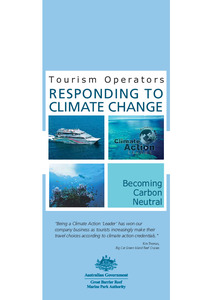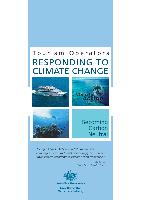Please use this identifier to cite or link to this item:
https://hdl.handle.net/11017/163

Full metadata record
| DC Field | Value | Language |
|---|---|---|
| dc.date.accessioned | 2012-05-25T01:14:58Z | en |
| dc.date.available | 2012-05-25T01:14:58Z | en |
| dc.date.copyright | 2010 | en |
| dc.date.issued | 2010 | en-US |
| dc.identifier.uri | https://hdl.handle.net/11017/163 | en |
| dc.description.abstract | What does it mean to be carbon neutral? The meaning of the term "carbon neutral" is evolving as the business of climate change moves forward. Put simply, gases in the atmosphere trap the sun's energy, keeping the Earth at a suitable temperature for life. This is called the greenhouse effect and the gases are called greenhouse gases. As levels of greenhouse gases (mainly carbon dioxide) increase, the atmosphere traps more heat, causing the temperature of the Earth to rise, leading to changes in our climate. In this case study, becoming carbon neutral means achieving a zero overall carbon output and therefore not contributing to climate change | en |
| dc.language.iso | en | en |
| dc.publisher | Great Barrier Reef Marine Park Authority | en |
| dc.relation.uri | https://hdl.handle.net/11017/164 | en |
| dc.relation.uri | https://hdl.handle.net/11017/165 | en |
| dc.relation.uri | https://hdl.handle.net/11017/1136 | en |
| dc.relation.uri | https://hdl.handle.net/11017/166 | en |
| dc.relation.uri | https://hdl.handle.net/11017/1135 | en |
| dc.rights | Copyright Commonwealth of Australia. This work is copyright. Apart from any use as permitted under the Copyright Act 1968, no part may be reproduced by any process without the prior written permission of the Great Barrier Reef Marine Park Authority. | en |
| dc.subject | Great Barrier Reef (Qld.)-Climate | null |
| dc.title | Tourism operators responding to climate change: becoming carbon neutral | en |
| dc.type | Brochure | en |
| dc.subject.asfa | Climatic changes | en |
| dc.subject.asfa | Ecosystem resilience | en |
| dc.format.pages | 4 | en |
| dc.description.notes | ID: 1832 | en |
| dc.contributor.corpauthor | Great Barrier Reef Marine Park Authority | en |
| dc.subject.apais | Tourism | en |
| dc.subject.apais | Greenhouse effect | en |
| dc.publisher.place | Townsville | en |
| dc.relation.connectiontogbrmpa | GBRMPA published this item | en |
| dc.subject.category | Information Publication Scheme | en |
| dc.subject.category | Tourism | en |
| dc.subject.category | Leading environmental practice | en |
| dc.subject.category | Climate change | en |
| dc.subject.category | Tourism operators | en |
| dc.subject.theme | People and actions | en |
| dc.subject.theme | Effects on the Reef | en |
| dc.subject.theme | Managing Multiple Use | en |
| dc.keywords | CCAP 08/09 | en |
| dc.keywords | C1.2 | en |
| dc.keywords | D2.2 | en |
| dc.keywords | D2 | en |
| dc.keywords | CCAP output | en |
| dc.keywords | 4.1.402.9.08 | en |
| dc.keywords | B2.4 | en |
| dc.keywords | B2.3 | en |
| dc.keywords | B2.2 | en |
| dc.keywords | B2 | en |
| dc.keywords | B2.1 | en |
| dc.keywords | C2.2 | en |
| dc.keywords | C2 | en |
| dc.keywords | C2.1 | en |
| dc.keywords | C1 | en |
| dc.keywords | C1.1 | en |
| dc.keywords | GBR | en |
| dc.keywords | Climate change | en |
| dc.keywords | Climate change action plan 1 | en |
| dc.keywords | tourism operations | en |
| dc.keywords | reduced climate footprints | en |
| dc.keywords | tourism | en |
| dc.keywords | Great Barrier Reef | en |
| dc.keywords | adaptation of industries and communities | en |
| dc.keywords | case studies | en |
| dc.keywords | mitigation | en |
| dc.keywords | resilient GBR ecosystem | en |
| dc.keywords | reducing emissions | en |
| Appears in Collections: | Community | |
Files in This Item:
| File | Description | Size | Format | |
|---|---|---|---|---|
| Tourism-operators-responding-to-climate-change-Becoming-carbon-neutral.pdf | 248.53 kB | Adobe PDF |  View/Open |
Items in ELibrary are protected by copyright, with all rights reserved, unless otherwise indicated.
